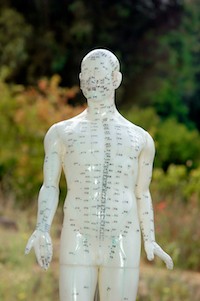New research finds acupuncture effective for the treatment of lung cancer symptoms.  The focus of the study was the evaluation of acupuncture and its effect on lung cancer related symptoms such as nausea, anxiety, pain, depression and a sense of not feeling well. A total of 33 lung cancer patients received 45 minute acupuncture treatments at a rate of 1 - 2 times per week for at least 4 treatments. The results demonstrated that acupuncture effectively reduced pain levels in over 60% of patients. Additionally, 30% of patients noted improvements with a sense of well-being with at least 4 acupuncture treatments. This number jumps to a 70% improvement in well-being when patients received 6 or more acupuncture treatments. The researches commented that there is a positive correlation between clinical improvements and increases in the number of acupuncture treatments received.
The focus of the study was the evaluation of acupuncture and its effect on lung cancer related symptoms such as nausea, anxiety, pain, depression and a sense of not feeling well. A total of 33 lung cancer patients received 45 minute acupuncture treatments at a rate of 1 - 2 times per week for at least 4 treatments. The results demonstrated that acupuncture effectively reduced pain levels in over 60% of patients. Additionally, 30% of patients noted improvements with a sense of well-being with at least 4 acupuncture treatments. This number jumps to a 70% improvement in well-being when patients received 6 or more acupuncture treatments. The researches commented that there is a positive correlation between clinical improvements and increases in the number of acupuncture treatments received.
The researchers concluded that acupuncture is safe, minimally invasive and demonstrates efficaciousness in the treatment of pain and in improving a sense of well-being for patients with lung cancer. Improvements in the reduction of pain, nausea, nervousness, shortness of breath, drowsiness and depression were shown. Increases in appetite, a sense of well-being and strength were also demonstrated. The study was performed at the Segal Cancer Center of Jewish General Hospital in Montreal, Canada. The cancer clinic has a specialized unit called the Peter Brojde Lung Cancer Center that focuses on clinical research on ways to improve medical outcomes for lung cancer patients.
The Acupuncture Points
The acupuncture treatments were limited to 45 minutes sessions at a rate of 1 - 2 times per week. The study also limited the use of acupuncture points to 6 body style acupuncture points and 3 auricular acupuncture points. The body style points were LI4, LV3, ST36, SP6, LU7 and the auricular points were shenmen, subcortex and point zero. The acupuncture needles were applied to a depth of 1 - 2.5 cm for the body style points until a de-qi sensation was achieved. De-qi is often described by patients as a dull, numb or electrical sensation at the acupuncture needle site. De-qi is often observed by licensed acupuncturists as a grasping effect on the needle. This is sometimes called the fishing effect because the acupuncturist feels a grasping and pulling on the needle much like a fisherman feels a tug on the fishing pole when a fish grabs the line.
There were a total of 33 patients studied, 17 females and 16 men. A total of 9 patients had early state lung cancer and 24 had advanced stage lung cancer. A total of 30 patients had non-small-cell lung cancer and three had small-cell lung cancer. The mean age was 62.
Prior to acupuncture treatments, 22 of the patients in the study reported moderate to severe pain. This number dropped to only 11 patients with moderate to severe pain after acupuncture. A total of 8 patients were taking narcotics for the treatment of pain. These patients had a significant reduction of pain levels following the application of acupuncture.
Unique Research
The researchers note that this is the first study of its kind to limit its sample size to lung cancer patients only. They cited another study of cancer patients demonstrating significant improvements in the reduction of pain but that this study “consisted of mixed cancer patients….” Only 2 of the 70 patients had lung cancer.
How Acupuncture Works
The researchers cited investigations into the effective biological mechanisms and pathways of acupuncture. They note that Traditional Chinese Medicine (TCM) uses acupuncture meridian theory that relates to neurovascular tissue planes within the body. They noted that biomedical research suggests that acupuncture has a somatosensory stimulatory effect causing the release of endogenous opioids. They also noted that acupuncture causes electrophysiologic changes in the nervous system. This includes acupuncture’s ability to cause the release of neurotransmitters, neuropeptides and hormones that regulate body functions. The investigators note that this is achieved by acupuncture’s electrophysiologic effect on the brain, pituitary gland and autonomic nervous system. The researchers note that a modern hypothesis based on research is that these biological mechanisms explain how acupuncture regulates blood pressure, body temperature, decreases inflammation and improves cancer related symptoms.
References:
Kasymjanova, G., M. Grossman, T. Tran, R. T. Jagoe, V. Cohen, C. Pepe, D. Small, and J. Agulnik. "The potential role for acupuncture in treating symptoms in patients with lung cancer: an observational longitudinal study." Current Oncology 20, no. 3 (2013): 152.
Alimi D, Rubino C, Pichard–Léandri E, Fermand–Brulé S, Dubreuil–Lemaire ML, Hill C. Analgesic effect of auricular acupuncture for cancer pain: a randomized, blinded, controlled trial. J Clin Oncol. 2003;21:4120–6. doi: 10.1200/JCO.2003.09.011.
Lu W, Dean–Clower E, Doherty–Gilman A, Rosenthal DS. The value of acupuncture in cancer care. Hematol Oncol Clin North Am. 2008;22:631–48.
Molassiotis A, Panteli V, Patiraki E, et al. Complementary and alternative medicine use in lung cancer patients in eight European countries. Complement Ther Clin Pract. 2006;12:34–9.
O’Regan D, Filshie J. Acupuncture and cancer. Auton Neurosci. 2010;157:96–100.
Lee H, Schmidt K, Ernst E. Acupuncture for the relief of cancer-related pain—a systematic review. Eur J Pain. 2005;9:437–44.

